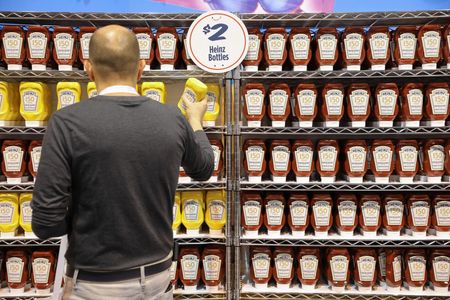(Reuters) -Kraft Heinz is studying a potential spin off of a large chunk of its grocery business, including many Kraft products, into a new entity that could be valued at as much as $20 billion on its own, a source familiar with the matter said on Friday.
However, the structure of the deal could change and there is no guarantee Kraft Heinz would move forward with any such deal, the source said.
News of the potential move is the second effort this week by a storied U.S. company looking to shore up shareholder value as shoppers ditch their pricey products in an uncertain economy. Earlier this week, cereal maker WK Kellogg agreed to a $3.1 billion buyout deal from Italy’s Ferrero.
The Wall Street Journal first reported the development earlier in the day. According to the report, a split, which would leave the company with products such as its namesake Heinz ketchup and Dijon mustard brand Grey Poupon, could be finalized in the coming weeks.
“As announced in May, Kraft Heinz has been evaluating potential strategic transactions to unlock shareholder value,” a company spokesperson said.
Its shares closed up 2.5%. The company currently has a market value of $31.33 billion.
Kraft Heinz was formed in 2015 after Warren Buffett’s Berkshire Hathaway and Brazilian private equity firm 3G Capital combined the former Kraft Foods with H.J. Heinz, which they bought in 2013. But it has been a challenging investment for Berkshire.
Inflationary pressures and a shift in focus toward fresher, less processed food have hurt demand for Kraft Heinz’s lunch combos and other products. It lowered annual forecasts and reported a dour quarter in April, hurt by muted consumer spending.
Kraft Heinz also said last month it would stop the launch of new products with artificial colors in the U.S. after Health Secretary Robert F. Kennedy Jr. outlined plans to remove synthetic food dyes from the U.S. food supply to address chronic diseases and conditions.
“KHC spinning off its grocery business echoes the 2023 Kellogg spinoff in which the company spun off its cereal business, which had been in volumetric decline for some time,” said Connor Rattigan, analyst at Consumer Edge.
“As CPGs (consumer packaged goods makers) contend with both changing consumer preferences and a challenging consumer environment, other CPGs may look to M&A and or similar corporate actions to improve their category exposures and improve their top-line trajectory,” Rattigan said.
(Reporting by Anuja Bharat Mistry, Juveria Tabassum in Bengaluru and Abigail Summerville in New York, Additional reporting by Neil J Kanatt in Bengaluru; Editing by Shilpi Majumdar)










